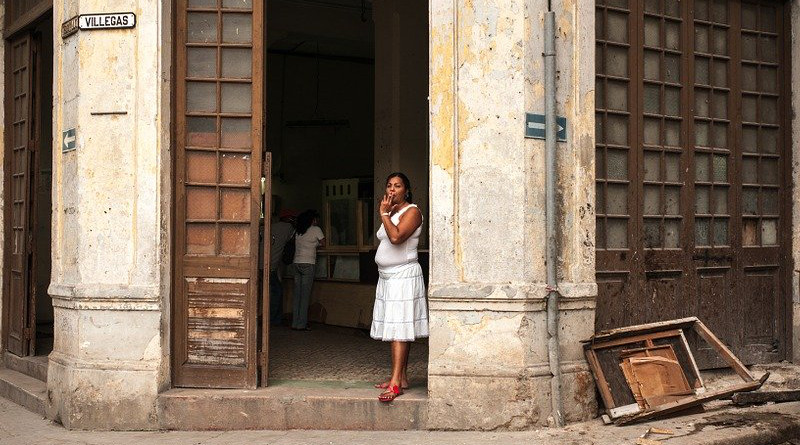Cuba: Authorities Step Up Harassment Of Independent News Centre
The Cuban authorities are waging a campaign to intimidate Hablemos Press, a Havana-based independent news centre, presumably because of its criticism of the government. In the past three months, 14 of its correspondents have been threatened and 10 have been briefly detained on at least one occasion.
According to Hablemos Press director Roberto Jesús Guerra Pérez, the situation began to deteriorate during the 6th Congress of the Cuban Communist party in April, when new economic and social measures were announced. Security agents banned journalists from leaving home throughout the congress, Guerra said.
The hounding of Hablemos Press is typical of the plight of independent journalists in Cuba, where civil liberties are universally flouted. A new crackdown has been launched on anyone trying to express dissident views. Journalists are being subject to repeated arrests and brief spells in detention with the aim of reducing them to silence.
“The measures announced during the 6th Congress must be accompanied by an opening-up on human rights and democracy issues,” Reporters Without Borders said. “We call for the legalization of independent media that are not controlled by the state, an end to the criminalization of dissident views, access for all Cubans to an unfiltered Internet and the repeal of all laws that restrict media freedom. The government must also honour its international obligations by ratifying the two UN conventions on civil and political rights that it signed in 2008.”
“This is a psychological war,” Guerra said, referring to the harassment of journalists. “They are trying to silence us by means of death threats, incitement to leave the country with our families, and repeated detention and interrogation, often lasting more than four hours at a stretch.”
According to a report that Guerra provided to Reporters Without Borders, the legal basis on which many independent journalists have been arrested and detained is a provision of Law 88 on the Protection of National Independence and the Cuban Economy, also known as the “gag law.” Under this provision, anyone who is deemed to have caused serious harm to the economy by cooperating with foreign media can be sentenced to two to eight years in prison. Many journalists were arrested under the same provision during the “Black Spring” of 2003.
Calixto Ramos Martínez Arias, who has been a Hablemos Press correspondent since 2009, was arrested twice in May. The second time he was arrested, on 16 May, he spent 75 hours in police custody on the orders of a state security official, although no grounds were given. After destroying his ID card, the state security official said he would shoot Martínez in the head the next time he saw him in the police station. Martínez was repeatedly deported from Havana to Camaguey in 2010 because of his journalistic work.
Jorge Alberto Liriano Linares, the Hablemos Press correspondent in Camagüey, was physically attacked by state security agents while covering a demonstration organized by the Carlos Manuel de Céspedes Human Rights Union in 3 June, suffering bruising to the ribs and cuts to the face and body. He was then held for eight hour in a state security unit, where he received no medical treatment. He says he was subjected to “psychological torture and systematic mistreatment.”
Carlos Ríos Otero and Sandra Guerra have been threatened by both state security agents and members of the national police in Havana. Ríos has been arrested twice. Guerra was detained for more than 48 hours in her home by a total of 20 agents. Stones were thrown at the home of Jaime Leygonier Fernández after he wrote an article that was very critical of the government.
Yoandris Gutiérrez Vargas, Enyor Díaz Allen and Raul Alas Márquez have all been detained twice. Gutiérrez was arrested on 17 and 22 June while covering dissident Jorge Cervantes’ hunger strike in Santiago de Cuba. Díaz was arrested in Guantánamo, where he was also physically attacked by government supporters during the 6th Congress. Alas was arrested in Cielo de Avila.
Magaly Norvis Otero Suárez, a journalist who works for both Hablemos Press and Miami-based Radio Martí, was insulted on 7 June, She also keeps a blog in which she reports arbitrary arrests and other human rights abuses.
Four prisoners – Alexander Suárez Torres, Carlos Amir Cárdenas Cartava, Jorge Félix Otero Morales and Ramón Arias Acosta – suffered a deterioration in prison conditions after providing Hablemos Press with information. Suárez and Cárdenas were transferred from Havana to prisons in Camagüey. Otero and Arias were confined to punishment cells.
Finally, the dissident cyber-journalist Guillermo Fariñas, winner of the European Parliament’s Sakharov Prize for Freedom of Thought in 2010, was detained yet again on 27 May and was held for 12 hours at the provincial police operations headquarters along with 11 other dissidents.
The Cuban people are still denied the right to receive and impart information and several journalists have been forced to leave the country. On World Refugee Day on 20 June, Reporters Without Borders paid tribute to those journalists who, after being forced to flee their country, continue to work as journalists and thereby defy those who tried to silence them.
In this report, entitled “Forced to flee but not silenced – exile media fight on,” Reporters Without Borders interviewed refugee journalists from all parts of the world, including Cuba, with the aim of helping to make their voices heard.

